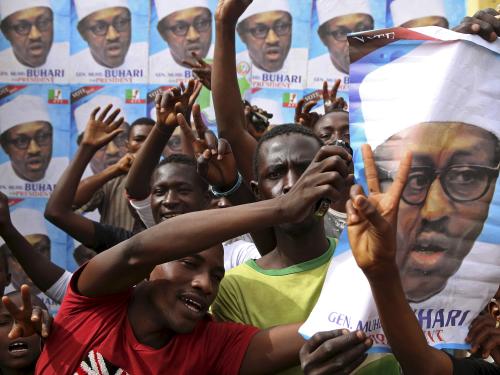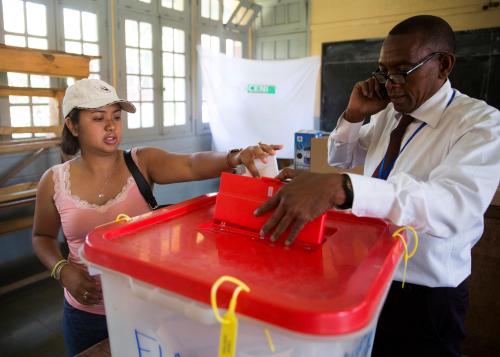President Obama’s presidency has witnessed widespread change throughout Africa. His four trips there, spanning seven countries, reflect his belief in the continent’s importance—even if he arguably hasn’t been able to devote the resources he might have wished, given the myriad of competing demands. African countries face a range of challenges on trade, investment, and development, as well as on security and stability.
What legacy will Obama leave on the continent? On July 19, the Africa Security Initiative hosted a discussion on President Obama’s legacy in Africa, featuring Matthew Carotenuto, professor at St. Lawrence University and author of “Obama and Kenya: Contested Histories and the Politics of Belonging,” and Sarah Margon, Washington director at Human Rights Watch. Brookings Senior Fellow Michael O’Hanlon moderated the conversation.
O’Hanlon observed that Africa’s 54 countries have, on the whole, seen reasonably high economic growth rates in the past two decades. There’s been a slight decline recently, due in part to reduced demand for commodities in China. Trends in the spread of democracy have followed a similar path. The continent’s population is also continuing to grow rapidly. Security threats have eased in some places, he said, and intensified in others. Besides a few regional conflicts and human rights issues—some quite significant—the continent is arguably showing more promise than at any previous time, yet recent years have seen some reversals.
Obama’s policies in Africa
Margon highlighted some strengths and weaknesses of Obama’s policy in Africa. Strengths, in her view, include that the Obama administration:
- Improved governance and democracy through strong messaging;
- Balanced counterterrorism and civil rights, without letting the former dominate the latter;
- Made human rights and LGBT issues a clear priority;
- Carried out the Africa Leader’s Summit and the “Power Africa” electricity initiative, with modestly promising results; and
- Used social media to engage local populations.
Weaknesses, Margon argued, were that the administration:
- Focused on security assistance in ways that gave somewhat less priority to governance issues at times, at least in terms of U.S. financial resources, and aligned the United States with authoritarian regimes in several cases;
- Provided inconsistent follow-up towards crisis response in Guinea, Nigeria, and the Central African Republic, among other places; and
- Failed to hold governments accountable for human rights violations in places like Ethiopia.
A closer look at Kenya
Obama’s relationship with Africa is particularly challenging because of his Kenyan heritage, Carotenuto argued. He noted that Obama was sensitive to charges of favoritism and to critiques that he might be too focused on the continent of his relatives and his late father. In the United States, the “birther conspiracy” garnered a good deal of media attention, he said, and delayed Obama’s visit to Kenya until 2015. On the other hand, once Obama did go—he was the first sitting American president to do so—he was well-received because of his diaspora tie.
Obama has managed to nurture ties with Kenya despite the political turbulence in the country, Carotenuto continued. Kenya’s 2007 elections sparked a period of post-election violence, during which more than 1,300 people were killed. Current President Uhuru Kenyatta and Deputy President William Ruto have since been tried by the International Criminal Court for human rights violations during that time, and during their trials attempted to deflect blame by painting the ICC and the Obama administration as neo-colonial institutions favoring the opposition party. Since then, according to Carotenuto, there has been a rise in authoritarianism in Kenya, with increased restrictions on freedom of the press and a rise in human rights abuses. To further complicate matters, he added, al-Shabab has become a rising security threat for Kenya. Although the United States first began conducting drone strikes against the group in June 2011—with a Kenyan military intervention in Somalia following shortly after—there has been little effort to engage local development issues in Kenya’s northeast, where many Somalis live. This, combined with President Kenyatta’s recent decision to close the Dadaab refugee camp (which would displace 300,000 people), has caused greater insecurity, according to Carotenuto. At the same time, Kenya has made progress in other areas: for example, it passed a very progressive constitution in 2010.
Across the continent, meanwhile, Nigeria faces similar security threats from Boko Haram—but U.S. policies between Kenya and Nigeria vary greatly. Prior to Nigerian President Muhammadu Buhari’s presidency, Washington put more pressure on Nigeria than on Kenya to reform, Carotenuto said. Kenya has generally not been held accountable, as the United States has continued to support its fight against al-Shabab.
Authoritarians, term limits, and popular sovereignty
As Margon explained, there has been a dramatic expansion of security assistance across the board in Africa. That can be problematic when the aid supports countries with authoritarian regimes like Rwanda and Uganda. Margon was particularly disappointed with Obama’s 2015 visit to Ethiopia. She believes Obama has failed to hold Ethiopia accountable, particularly after a 2009 counterterrorism law led to a clampdown on civil society.
Carotenuto and Margon also addressed the issue of long-term leaders like President Kagame of Rwanda, President Kabila of the Democratic Republic of Congo, and President Museveni of Uganda. All have used—and in some cases abused—the election process to allow themselves to stay in power. This has not just weakened the political system, in their views, but damaged citizens’ autonomy. Countries like Uganda, where a president has been in power for many years, see more violations of basic human rights, Margon observed. Carotenuto pointed to 2014 Afrobarometer data suggesting that Africans overwhelmingly support democracy; promoting term limits is not just an American or Western project.
Overall, the participants agreed that the effects of Obama’s legacy in Africa have not yet been fully manifested. The fact that Barack Obama was the first African-American elected to be president in U.S. history will not necessarily make his legacy in Africa particularly historic.
Note: Anne Wilcox, an intern with the Center on 21st Century Security and Intelligence, co-authored this post.






Commentary
Obama’s legacy in African security and development
July 25, 2016